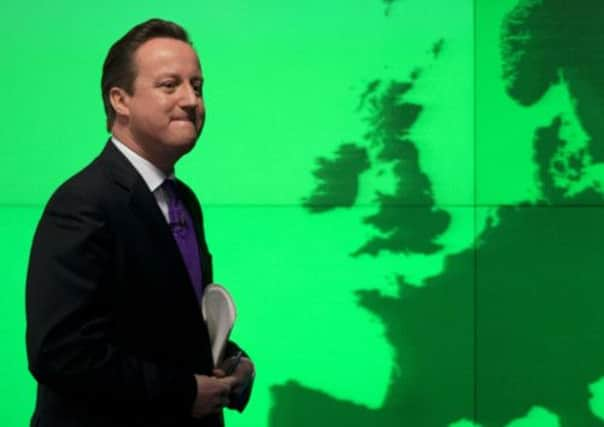Stuart Coster: We should not be denied a vote over Europe


Forty years have passed since Britain joined the then EEC and the intervening period has seen a huge increase in the power exercised by what is now the EU in terms of how we are governed.
A glance at the “EU by topic” section of the European Union’s website shows that Brussels now has a hand in a near complete array of government policy areas, from agriculture to social affairs, foreign affairs to health and justice to transport. Its directives have commanded highly controversial changes such as the fragmentation of the railway network, the tendering to private companies of the most profitable areas of the Royal Mail and the outlawing of many alternative health products.
Advertisement
Hide AdAdvertisement
Hide AdThat it’s time for a fresh reappraisal and definitive vote on the extent of political decision-making that goes on in remote Brussels’ institutions rather than in Westminster is such an eminently reasonable suggestion that it’s hard to understand why some still seek to block such a debate.
The “no EU choice for you because you might disagree with me” stance that some politicians are exhibiting is not only repellently arrogant, it also shows little faith in the strength of their own convictions. Far worse, blocking a referendum that polls show the vast majority of people want couldn’t be further from the sort of responsive message our democratic system should be sending out if it wishes to rebuild public trust.
But instead of joining an open debate about Britain’s ideal future relationship with Brussels, so far the EU lobby has preferred to engage in some rather lame scaremongering about the outcome of a British exit.
EU advocates, like former commissioner Lord Mandelson, talk about the number of jobs that depend on trade with the EU, while refusing to acknowledge that trade with EU countries would be likely to be unaffected if we decided to leave the political structures of Brussels.
Advertisement
Hide AdAdvertisement
Hide AdBritain has a trade deficit with the EU, which means EU countries sell more to us than we sell to them. It would therefore be very much in their interests, as well as ours, to negotiate a UK-EU free trade agreement to replace our EU membership. Dozens of non-EU countries like Turkey and even Mexico already have such agreements, providing them with free access to the single market without having to suffer EU regulation of their domestic affairs nor pay billions a year in membership fees.
Even if the EU wanted, perversely, to put up tariff barriers to trade as a result of us leaving, this would be illegal under the rules of the World Trade Organisation. The WTO forbids its members from hitting each other with higher tariffs than they apply to other signatories under the Most Favoured Nation principle.
But what of our trade with the world beyond Europe; can’t we get better deals by negotiating as a bloc? This idea is flawed in two ways. First, the EU lobby confuses Britain’s geographic size with our economic clout.
We may be a small island but, according to the International Monetary Fund, the UK is the world’s sixth largest economy. Even Iceland, 120th in the same list, recently concluded a free trade deal with China.
Advertisement
Hide AdAdvertisement
Hide AdSo the idea that Britain can’t negotiate successfully with the world’s rising economic powerhouses is at best overly pessimistic and, at worst, abject nonsense. Secondly, the EU’s structure and economic diversity means deals take longer to negotiate and it’s highly unlikely that the “lowest common denominator”negotiating position of the EU will be a better option for Britain than the terms we might seek for ourselves independently.
A new EU referendum, when it comes, would be nothing less than a pivotal strategic choice about whether, as a country, we wish to limit our ambitions to the confines of a politically centralised Europe or carve a more prosperous path by maintaining the political influence and economic freedom to develop relationships with the much faster-growing world beyond.
Europe may have been the future once, but its share of world GDP is set to drop from 19 per cent today to seven per cent by 2050.
UK exports to other EU countries now only account for nine per cent of our GDP and a clear majority now go to countries beyond the single market. Success for our businesses and our economy cannot come from linking ourselves ever more closely to a declining European market.
Advertisement
Hide AdAdvertisement
Hide AdLeaving the EU would not be a decision to reject European trade, just a rejection of EU government.
It would provide both the political freedom and the economic focus on the wider world beyond Europe on which our 21st century prosperity will depend.